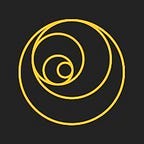Bacteria Are Masters of Tai Chi
The remarkable science that helped me understand what it means to be a physicist
By Madison Krieger
When I began studying how animals swim, I didn’t feel much like a physicist. I’d just finished my bachelor’s in physics during which time I’d been taught that physicists work on one of a handful of buzzwords: quantum mechanics, cosmology, gauge theory, and so on. To see if graduate school was right for me, I shadowed a friendly research group at the University of California, San Diego — but they didn’t study any of these buzzwords. They used high-powered mathematics to understand things like the locomotion of snails, worms, and microorganisms.
I was grateful for the opportunity, and I thought the problems they studied were beautiful and interesting — just not fundamental physics. As I became more involved in the group, this distinction grew into an identity crisis. Theoretical physicists are kind of like artists, or athletes: If you feel yourself drifting further from Klee or Peyton Manning, it can seem like a catastrophe. I thought I could feel Einstein and Feynman looking down at me and frowning as I took a turn down the wrong path.
It would take some impressive feats by microorganisms to convince me that they were as sexy as smashing atoms together — and they…
